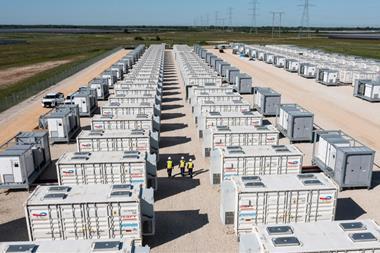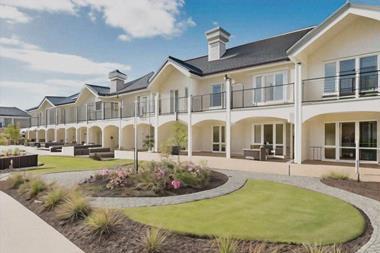In February, Jon Gray brought to end a 12-year stint as Blackstone’s real estate chief. Together with Kathleen McCarthy, Ken Caplan took over as one of two global co-heads of real estate.
Blackstone has continued to be very active in real estate this year. Do you expect activity to slow down going forward given the length of the current market cycle – or are there still opportunities?
We are clearly in a more mature part of the cycle, particularly in the US where we have enduring tailwinds from strong economic growth and job growth, but where there are concerns relating to rising interest rates and low cap rates. That said, these concerns are not new and there are still opportunities to invest.
We expect more modest overall growth for real estate going forward, but there is a lot of technological innovation and disruption impacting the global economy and real estate, and we are seeing greater divergence of performance across geographies and sectors. This is creating an environment where you have to be much more selective and plays to our strengths as we focus on thematic investing where we see the strongest fundamentals, trends and performance from our existing portfolio and the potential for growth. Our level of activity has varied by strategy and geography.
We’ve been less active this year investing opportunistic capital in the US and more active in Europe, but we are seeing an increase in US opportunities with recent market volatility and concerns over rising interest rates.
Where are the best opportunities today globally on a relative basis? Given pricing in the US, is your focus primarily on Europe and Asia-Pacific?
We see interesting opportunities around the world, but right now we are most active in Europe where there is still the greatest dislocation and less capital with all the concerns about Europe. The markets in Europe are also more fragmented. We have a very differentiated position in Europe with the scale of our capital, our relationships and our experienced team that’s been investing in the region for over 20 years.
What is your outlook for European real estate – both UK and continental – with Brexit looming? Will you have a specific strategy in place in the event of a no-deal?
Political uncertainty and relatively low growth have been features of the investment environment in Europe for some time and that continues to be the case. Our investments in Europe have not been predicated on a return to stronger economic growth, but rather have been about identifying value in sectors and geographies where we see strong underlying fundamentals and the potential to drive cash-flow growth through operations and strategic intervention. As in other parts of the world, we focus on our high-conviction investment themes and where we can play to our strengths of scale, speed, certainty and managing through complexity.
For the UK specifically, we’ve already seen the Brexit negotiations have a dampening effect on growth, but we remain positive on the long-term view. We continue to identify opportunities to invest and had a very active year acquiring infill logistics properties around the UK, for example. We also were recently awarded the Network Rail portfolio, which is a very unique and exciting investment for our core-plus business. We continue to have success with our existing portfolio following the Brexit vote, leasing 1.3m square feet of infill logistics assets across the UK, 1.7m square feet across our London office assets, and selling £2bn of assets from our London office portfolio.
This is a very granular, management-intensive portfolio – will this need to be a very long-term investment? There have been concerns raised about what will happen to the rents of the various small tenants. Is this something that needs to be managed carefully, especially with growing ESG demands from institutional investors?
We are excited about the Network Rail portfolio, which is expected to be a long-term hold for our investors. We are acquiring the portfolio in our core-plus Europe fund – an evergreen, modest-leverage strategy. We’ve also partnered with Tellereal Trillium, a well-respected UK property owner and operator that is similarly long-term focused. It is important to us that we have a positive relationship with the tenants in the arches portfolio and we want to hear their considerations and concerns so we can serve them better.
Our plan is to provide the proper management and capital to create a first-class organisation for tenants, local communities and the UK overall. We will develop and invest in these properties over the long-term so they become more attractive sites for tenants to grow and develop their businesses, and so communities can benefit from improved surroundings. We will remain particularly sensitive to the small businesses that have been long-term tenants of the Network Rail estate, and are committed to ensuring that the unique value they bring to their local communities is maintained.
What other property types do you find attractive going into 2019?
We’re high-conviction, thematic investors. One of our advantages is that we can analyse the proprietary data coming from our existing portfolio and management teams and identify patterns, which helps to guide our strategy. Right now, two of our highest conviction themes are logistics and rental housing.
As the e-commerce revolution continues, online retailers continue to drive demand for logistics assets, particularly last-mile locations. Limited supply, coupled with this increasing demand, has led to strong absorption and strengthening rent growth globally for infill logistics. We’ve also been active investing in rental housing globally. Urbanisation trends combined with muted supply have contributed to strong underlying fundamentals in this sector. In both logistics and rental housing and across just about all the sectors where we invest, our asset management team and best-in-class operating teams we’ve built create value post-acquisition. We’ve seen strong performance through operational and capital improvements, leasing space, improving occupancy levels and driving cash flow growth.
The acquisition from Tricon was a notable one. Do you see more opportunities in manufactured housing?
We like manufactured housing and are actively exploring additional opportunities in the space. We also like the opportunity to bring institutional quality ownership, management and capital to the properties we acquire. By investing additional capital in these properties and applying our management expertise, we can provide better experiences for our tenants and create substantial value over time.
How have you found the experience of – together with Kathleen McCarthy – taking over from Jon Gray? How has the transition gone over the past 10 months?
The transition has been extremely smooth as this was in planning for a long time. Kathleen and I had been taking on increasing responsibilities prior to the announcement, so it was quite natural when it happened. One of the first things we did was talk to our investors about this and we both feel very grateful for the universal support from our investors, our team and the market. It has been quite meaningful to me personally – it’s what you hope for and expect, but you still don’t know how people will react until the announcement happens.


















